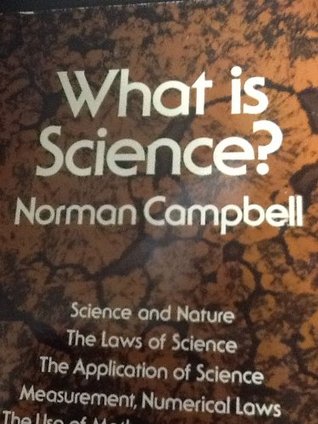

 |

|

The average rating for What is Science based on 2 reviews is 3.5 stars.
Review # 1 was written on 2016-11-05 00:00:00 Bruce Hamilton Bruce HamiltonA pragmatist essay on the nature and methods of science, which stresses the rôle of laws, theories, measurement and calculation, motivated by a sometimes faltering willingness to draw a line between ‘pure’ and ‘applied’ sciences. Without a doubt I can label this book one of the clearest and most straightforward expositions which addresses some of the most elusive and important philosophical problems in the characterization of scientific thought —including one of the earliest examples, to my knowledge, of ‘dissolution’ applied to the so-called “problem of induction” (pp. 60-61). Its cons are few, but some of them are worth noting: the social aspect of science and the shaping of scientific thought by certain scientific communities are completely neglected; the metaphysical commitment (underlined by Pierre Duhem in 1904) always present whenever the scientist not only “describes”, but “explains” reality is discreetly ignored; some problems raised by the author are left unanswered —for instance “are theories real?” In p. 104—, and the book lacks almost completely any reference to further reading. In the end, I may say it's an interesting reading for the philosopher or historian of science, but certainly dated. |
Review # 2 was written on 2019-12-22 00:00:00 Matt Laws Matt LawsTechnology in Action does exactly what it says on the tin, offering a basic overview of technology including hardware, software, and networking, in an easily-readable and clearly organized format. Evans presents his text in thirteen chapters, beginning with the importance of technology in changing the world and then building from hardware (your computer and what all its pieces do) to software (application and system), before moving into networking and security and pointers on how to manage a digital lifestyle ethically. The final four behind-the-scenes chapters offer deeper dives into programming, databases, networking and security, and how the internet works. I read this in an Intro to IT class as part of my library science degree, and found it extremely helpful; while I recognized most of the terms and concepts the book featured, my knowledge was usually more of the fuzzy than the full understanding. In terms of practical non-class use, the chapter on understanding and assessing hardware helped me go through and clean up my system in a way I probably wouldn't have otherwise been comfortable doing. While I purchased the digital version of this text, I tended to ignore most of the digital features - explanatory videos make me wild, I'd much prefer to use the text - and while there were end-of-chapter basic programming exercises, I skipped them as they weren't mandated by my instructor. The digital glossary I used extensively, though I noticed it occasionally pulled up the wrong definitions. And if you're wondering about the MyITLab, all it contains is a series of quizzes and simulations (most extremely basic). I didn't find it terribly instructive, but it was necessary as my instructor graded on completion through that interface. While not generally something I'd be interested in curling up with on the sofa, Technology in Action is an extremely useful text that can function either as an introduction for the completely un-savvy or a refresher for those of us who've been using computers for years while treating their inner workings as a form of magic. Despite not being a page turner, it's written clearly and well, and is perfect for librarians looking to make the transition to digital. |
CAN'T FIND WHAT YOU'RE LOOKING FOR? CLICK HERE!!!